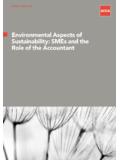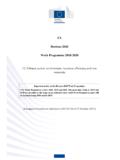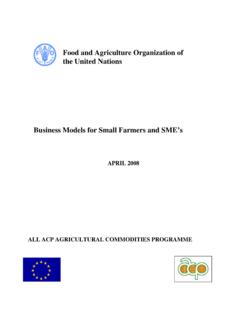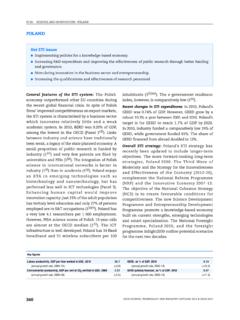Transcription of Digital Business Ecosystems
1 Digital Business EcosystemsEdited by:Francesco NachiraAndrea NicolaiPaolo DiniMarion Le LouarnLorena Rivera LeonEuropean CommissionInformation Society and Media Digital BusinessEcosystemsiii ForewordAt the Lisbon European Council of March 2000, the European Union representatives set the goal of making Europe the world s most dynamic and competitive knowledge-based economy with the need to promote an Information Society for All . One year later, the Gothenburg European Council of June 200 agreed a strategy for sustainable development which completes the European Union s political commitment to economic and social renewal by adding a third, environmental dimension to the Lisbon strategy. A new approach to policy making was therefore promoted to ensure that the economic, social and environmental effects of all policies would be considered in a coordinated way.
2 Both the Lisbon and Gothenburg strategies placed competitiveness firmly at the centre of political attention, and underlined the importance of creating a climate favourable to smes and the need to stimulate entrepreneurial initiative in order to achieve economic growth and sustainable Networked Enterprise and Radio Frequency Identification (RFID) unit of the European Commission s Information Society and Media Directorate-General aims at facilitating the emergence of future Business forms designed to exploit the opportunities and manage the challenges posed by the socio-economic and technical developments of the 2 st century. It recognises that businesses require new technologies, applications and services to enable them to work as networked knowledge-based enterprises.
3 One of the characteristics in the knowledge-based economy is the increasing collaboration among enterprises and economic and social agents, in order to offer innovative services and products, but also to engage in R&D activities. Cooperation has proved to be an endogenous feature of Europe, and one of its biggest strengths in global competition. Collaborative and innovative research has built in Europe a new sense of community and commitment to cooperate towards shaping the future ubiquitous information society . This community spirit has been particularly well understood and respected by all stakeholders in the field of the Networked Enterprise, which sees industry, academia, research centres, governmental bodies and agencies at all territorial levels, and end-user associations singing to the same tune. Inevitably, technological challenges will have to be paired with societal challenges.
4 The new standard set by this collaborative spirit calls for a new course of action as it recognises that the technologies and the economic and social aspects of development must be intertwined in order to achieve a sustainable economic and social Digital Business Ecosystems (DBE) Initiative responds ideally to this challenge of creating ICT instruments together with collaborative practices and paradigms that support economic growth and include all the societal and economic actors in the process. It has been commonly recognised as a new frontier for RTD in the knowledge-based iveconomy. Indeed, smes and local clusters are now competing in a global and dynamic market where they need more interrelations, more specialised resources, more research and innovation as well as access to global value chains and knowledge.
5 The research driven within the DBE Initiative supports all these necessities by offering an open infrastructure that combines human capital, knowledge and practices, technical infrastructure, and the Business and financial conditions - all modelled within the European industrial policy present book is therefore the result of extensive research driven by the DBE research community within the projects funded by the 6th Framework Programme of the European Commission. It brings together researchers from major European institutions and stakeholders involved in the projects of the cluster Technologies for Digital Ecosystems . It presents the projects main research and empirical achievements. Consequently, it also discusses the future perspectives and directions of the European DBE.
6 This work shows that in a few years the concept of Digital Business Ecosystems was coined initially in the context of the implementation of the eEurope 2002 action plan a new science was born; a scientific community was established; RTD projects have delivered results that start now to be transferred to the market; and a network of regional Digital Ecosystems was established. This book aspires to be ambitious, focussed, and forward-looking. As a consolidated result of the contributions of the large number of stakeholders involved in its conception, this book is a renewed commitment of those stakeholders engaged in the realisation of the long-term vision of the research surrounding the Digital Business Ecosystems initiative. We have heard of the Business opportunities and challenges that ICT research would bring.
7 The time has come to realise this promise of fostering the development of those technologies, systems, applications and services that are critical to achieving higher growth, more and better jobs, and greater social inclusion. G rald Santucci,European Commission, DG-Information Society and MediaHead of Unit Networked Enterprise and RFID vii Table of contentsForeword..iiiTable of Contents..viiPreface .. xiIntroduction - The Digital Business Ecosystems : Roots, Processes and Perspectives..1 Francesco Nachira, Andrea Nicolai, Paolo DiniSection 1 - Science, New Paradigms..23A Scientific Foundation for Digital Ecosystems ..24 Paolo DiniNatural Science Paradigms.. 48 Gerard Briscoe, Suzanne SadedinDigital Ecosystem and Language..56 Frauke Zeller, Josef WallmannsbergerBusiness Networks and Ecosystems : rethinking the biological metaphor.
8 60 Angelo Corallo, Stefania Protopapa viiiSection 2 - Economic and social aspects, New Paradigms.. 67 Towards Dynamic Clustering: Capabilities and IT Enablers.. 68 Ramon O CallaghanUnderstanding the Role of Governance in the context of Digital Ecosystems ..79 Mary DarkingA Cost-Benefit Analysis Framework for Assessing the Net Benefits of Digital Business Ecosystem implementation in Europe ..83 Lorena Rivera Le nA Critical, inward and outward, View of Digital Ecosystems open, collaborative Communities: interdisciplinarity, sustainability and scalability at the intersection of gift and exchange Economies ..92 Evangelia BerdouTrust among smes in Digital Business Ecosystems : Theoretical and Methodological Foundations for Establishing Trust through a Knowledge Base of Regulatory Issues.. 98 Silvia Elaluf-Calderwood, Panayiota TsatsouSection 3 - Digital Ecosystem Technology.
9 107 Digital Ecosystems Technology and Distributed Nature of Information.. 108 Miguel Vidal, Jes s E. Gabald nEcosystem Oriented Architecture (EOA) vs SOA ..111 Pierfranco FerronatoDE Services in Ecosystem Oriented Architecture ..119 Paul MaloneModelling Languages, BML, SBVR..125 Angelo Corallo, Virginia CisterninoDigital Ecosystem Topology: Information in Nature.. 130 Jes s E. Gabald n, Juanjo AparicioDistributed Infrastructural Services .. 134 John KennedyA Trusted Negotiation Environment for Digital Ecosystem ..141 Luigi Telesca, Hristo KoshutanskySocial Network Simulation and Self-Organisation .. 147 Thomas Kurz, Antonella Passani, Thomas J. HeistracherSection 4 - Case studies of Technology Transfer and Digital Ecosystem Adoption..157 The territorial Prospective of Digital Business Ecosystem.
10 158 Antonella PassaniPolicymakers: Making the region a good place to live, to work and to invest, How to Increase the Attractiveness of a Region ..163 Bertrand DoryThe Experience of the Aragon region as a catalyst of Digital Business Ecosystems .. 167 Javier Valix The West Midlands regional catalyst role in the activation of the Digital Ecosystem.. 170 Nagaraj Konda, Victor Bayon, Rod SheltonEvolution of a Digital Ecosystem for Knowledge Services to Indian Agriculture .. 176 Jayanta Chatterjee, TV Prabhakar, Runa SarkarDBE in Ireland: an Irish Open & Connected Digital Ecosystem Initiative .. 183 Anne English, Bertrand DorySynergies between Pontos de Cultura and Ecosystems .. 186 Matilde Ferraro, Francesca Bria, Oriana PersicoSection 5 - Digital Ecosystem Projects Cluster..195 The Technologies for Digital Ecosystems cluster of FP6 projects.







